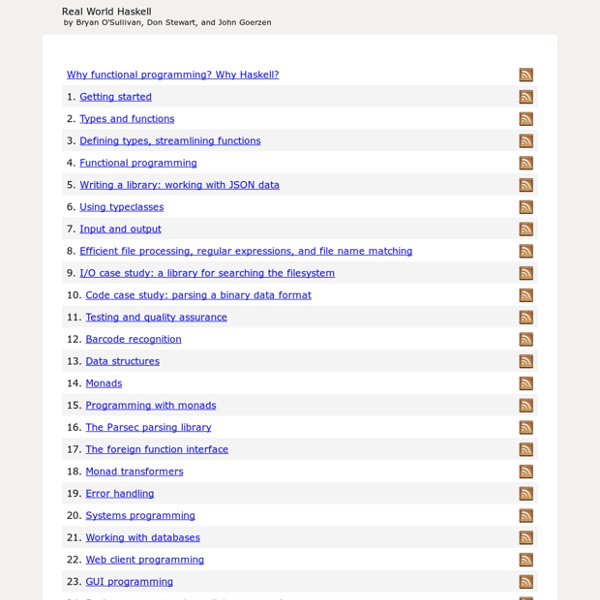Neil Mitchell - HLint
HLint (formerly Dr. Haskell) reads Haskell programs and suggests changes that hopefully make them easier to read. HLint also makes it easy to disable unwanted suggestions, and to add your own custom suggestions. Running the tool over the darcs source code, we can generate an interactive report with --report, or view the results in the console:
Introduction - Learn You a Haskell for Great Good!
About this tutorial Welcome to Learn You a Haskell for Great Good! If you're reading this, chances are you want to learn Haskell. Well, you've come to the right place, but let's talk about this tutorial a bit first. I decided to write this because I wanted to solidify my own knowledge of Haskell and because I thought I could help people new to Haskell learn it from my perspective.
One Day, We Will All Be Programmers
I probably spend more time than I should thinking about the economy. When I do, I often think about what it is most residents of the West do for a living, which I like to call the “economic profile” of the West. (Others call this employment by sector.) I think about how that profile has changed in the last hundred or so years, and about how it might change in my lifetime. The first revolution of automation, the industrial revolution, had a significant impact on the West’s economic profile. Societies of agricultural workers transformed into societies of manufacturing laborers.
Home Page
The Haskell School of Expression: Learning Functional Programming through Multimedia by Paul Hudak, Yale University Cambridge University Press, New York, 2000 416 pp./15 line diagrams/75 exercises Paperback $29.95, ISBN: 0521644089 Hardback $74.95, ISBN: 0521643384 Abstract:
Introduction
Haskell is a computer programming language. In particular, it is a polymorphically statically typed, lazy, purely functional language, quite different from most other programming languages. The language is named for Haskell Brooks Curry, whose work in mathematical logic serves as a foundation for functional languages. Haskell is based on the lambda calculus, hence the lambda we use as a logo.
Why I love Lisp
This post was extracted from a small talk I gave at Simplificator, where I work, titled “Why I love Smalltalk and Lisp”. There’s another post titled “Why I love Smalltalk” published before this one. Desert by Guilherme Jófili Lisp is an old language.
C9 Lectures: Dr. Erik Meijer - Functional Programming Fundamentals, Chapter 1 of 13
Welcome to a new technical series on Channel 9 folded into a different kind of 9 format: C9 Lectures. These are what you think they are, lectures. They are not conversational in nature (like most of what you're used to on 9), but rather these pieces are entirely focused on education, coming to you in the form of a series of high quality technical lectures (1 or more per topic) on a single topic. We kick off C9 Lectures with a journey into the world of Functional Programming with functional language purist and high priest of the lambda calculus, Dr.
-= Perlis Languages =-
Perlis Languages this is another entry in a series on programmer enrichment A language that doesn’t affect the way you think about programming is not worth knowing. — Alan Perlis inspired by a LtU thread and the great post Programming Achievements: How to Level Up as a Developer by Jason Rudolph1. most code samples from Rosetta Code. The philosopher Friedrich Nietzsche believed that all interactions and interpretations of the external world occurred through the lens of individual perspective.
4.12. Using shared libraries
On some platforms GHC supports building Haskell code into shared libraries. Shared libraries are also sometimes known as dynamic libraries, in particular on Windows they are referred to as dynamic link libraries (DLLs). Shared libraries allow a single instance of some pre-compiled code to be shared between several programs.
Scala Actors are Just Code - No Magic
Dear Junior First time I tried out actors in Scala I though: "OK, there is a fair amount of magic going on here". I have later realised that there is actually no magic at all involved, but I would like to share with you my misconception and how it cleared out. I am talking about syntax like vlad !
Hoogle - st lib
Hoogle is a Haskell API search engine, which allows you to search many standard Haskell libraries by either function name, or by approximate type signature. Example searches: map (a -> b) -> [a] -> [b] Ord a => [a] -> [a] Data.Map.insert Enter your own search at the top of the page. The Hoogle manual contains more details, including further details on search queries, how to install Hoogle as a command line application and how to integrate Hoogle with Firefox/Emacs/Vim etc. I am very interested in any feedback you may have.


